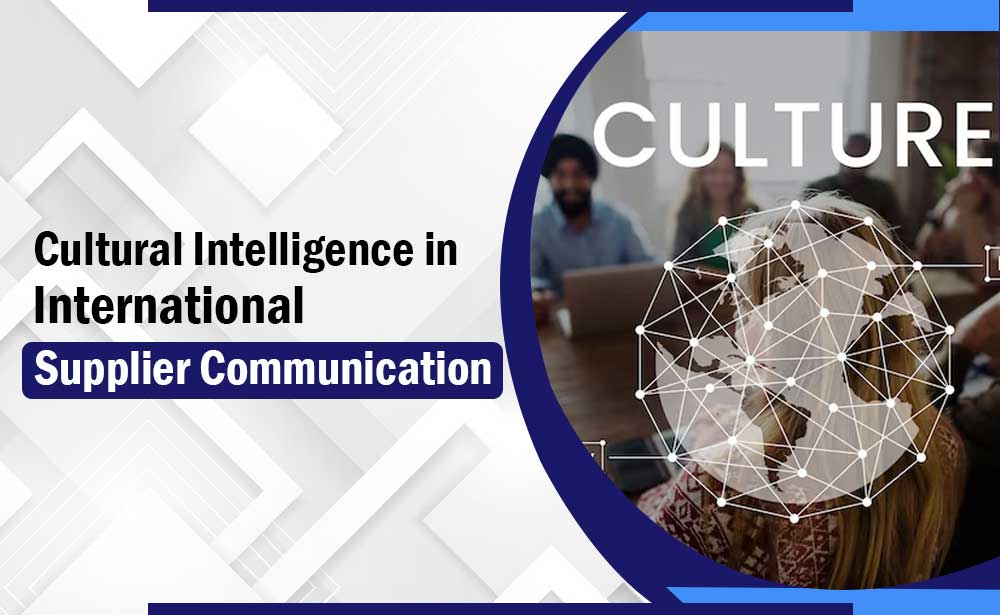
Overcoming Language and Cultural Barriers in International Supplier Communication
International supplier communication is more critical than ever in today’s globalized business landscape. Companies are increasingly relying on suppliers from around the world to provide essential goods and services. While this opens up new opportunities, it also presents challenges regarding language and cultural differences. This post will explore the importance of effective international supplier communication and strategies to overcome language and cultural barriers.
The Significance of International Supplier Communication
International supplier communication is the lifeline of modern businesses. It’s the means through which companies interact with their suppliers across borders. This communication encompasses various activities, including order placement, quality assurance, negotiations, and conflict resolution. Effective communication ensures that suppliers understand your requirements and can meet them efficiently.
The Challenges of Language and Cultural Barriers
Language and cultural barriers are common challenges in international supplier communication. These barriers can lead to misunderstandings, delays, and even conflicts.
Let’s delve into these challenges:
- Language Barriers: When dealing with suppliers from different linguistic backgrounds, language barriers can impede effective communication. Misinterpretations or incomplete information exchange can lead to errors in orders, specifications, or delivery times.
- Cultural Differences: Cultural norms and expectations vary significantly between countries. What may be considered polite or professional in one culture might be seen differently in another. These differences can affect the tone, approach, and effectiveness of communication.
- Time Zones: Operating across different time zones can delay responses and decision-making. Waiting for information or approvals can slow down supply chain processes.
Strategies for Overcoming Language and Cultural Barriers
Effective international supplier communication requires strategies to bridge language and cultural gaps. Here are some key strategies to consider:
- Multilingual Teams: Employ individuals who are fluent in the languages of your international suppliers. Having team members who understand the culture and language of your suppliers can help in effective communication and relationship-building.
- Clear Documentation: Use clear and concise documentation, such as detailed product specifications, contracts, and purchase orders. Ensure that these documents are available in multiple languages if necessary.
- Translator Services: Utilize professional translation services for critical documents or communications. This ensures accuracy and reduces the risk of misunderstandings.
- Cross-Cultural Training: Provide cross-cultural training to your team members in international supplier communication. This training can help them understand cultural differences and adapt their communication style accordingly.
- Regular Communication: Maintain regular communication with your international suppliers, even with no immediate issues. This builds rapport and trust over time.
- Video Conferencing: Opt for video conferencing instead of email or phone calls whenever possible. Visual cues and body language can convey information that words alone may not.
- Clarification and Confirmation: Encourage suppliers to seek clarification if any aspect of your communication is uncertain. Likewise, confirm your understanding of their messages to avoid misunderstandings.
The Role of Supplier Qualification Management
Supplier qualification management is pivotal in addressing language and cultural barriers in international supplier communication. This involves a systematic process of assessing and verifying the capabilities of your suppliers. Here’s how it can help:
- Language Proficiency Assessment: As part of supplier qualification, assess the language proficiency of key supplier contacts. This ensures that those responsible for communication have an excellent command of the language.
- Cultural Compatibility: Consider cultural compatibility as part of the supplier qualification process. Evaluate whether a supplier’s values and practices align with your organization’s culture.
- Communication Plans: Develop communication plans with each international supplier. These plans should outline the preferred communication channels, frequency of communication, and language preferences.
- Escalation Protocols: Establish clear escalation protocols in case of misunderstandings or disputes. Knowing how to handle conflicts or issues arising from language or cultural differences can prevent disruptions.
Case Study: Effective Supplier Qualification Management in Action
Let’s look at a hypothetical case study to illustrate the benefits of effective supplier qualification management in overcoming language and cultural barriers:
Company X, a multinational electronics manufacturer, sources electronic components from a supplier in Japan. Initially, communication challenges arose due to language differences and different cultural communication styles.
To address these issues, Company X implemented the following steps:
- Supplier Assessment: The company assessed the Japanese supplier’s key personnel for their English language proficiency and cultural understanding.
- Customized Communication: A communication plan outlining the use of both English and Japanese in written and verbal communication was developed. Video conferences were scheduled regularly.
- Cross-Cultural Training: Company X provided cross-cultural training to its procurement team, emphasizing the importance of respecting Japanese customs and business etiquette.
- Translation Services: Professional translators translated Critical documents into Japanese to ensure accuracy.
- Feedback Mechanism: Both parties established a feedback mechanism to address any issues promptly.
As a result of these efforts, communication between Company X and its Japanese supplier became more efficient and productive.
Misunderstandings were reduced, and the relationship between the two companies improved significantly.
Conclusion: Effective International Supplier Communication is Key
Effective international supplier communication is crucial for success in the global business landscape. While language and cultural barriers can pose challenges, they can be overcome through careful planning, cultural awareness, and supplier qualification management. By investing in these strategies, businesses can build stronger relationships with their international suppliers, reduce risks, and ensure the smooth flow of goods and services across borders.
If you’re ready to fortify your international supplier communication and enhance your supplier qualification management with solutions like AsterDocs today! Comprehensive solutions empower modern businesses to navigate the complexities of the global supply chain.



